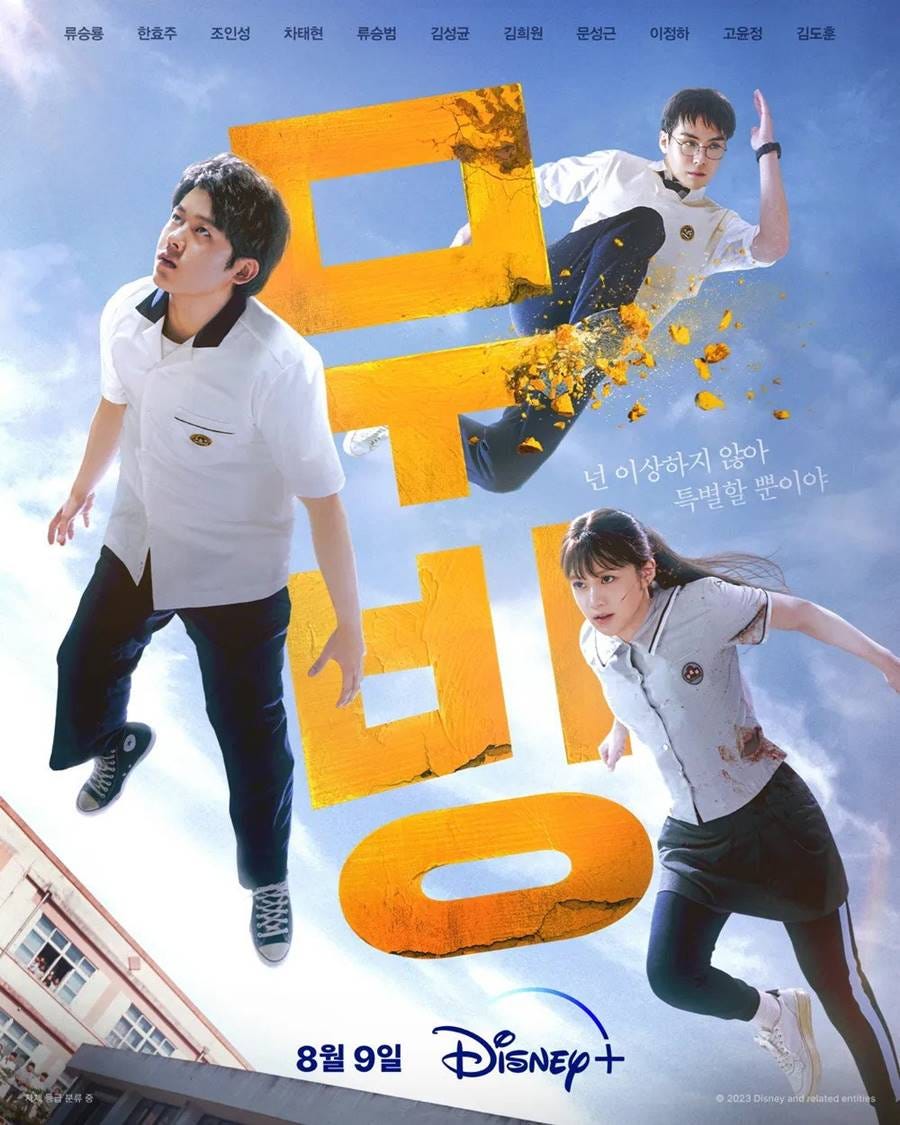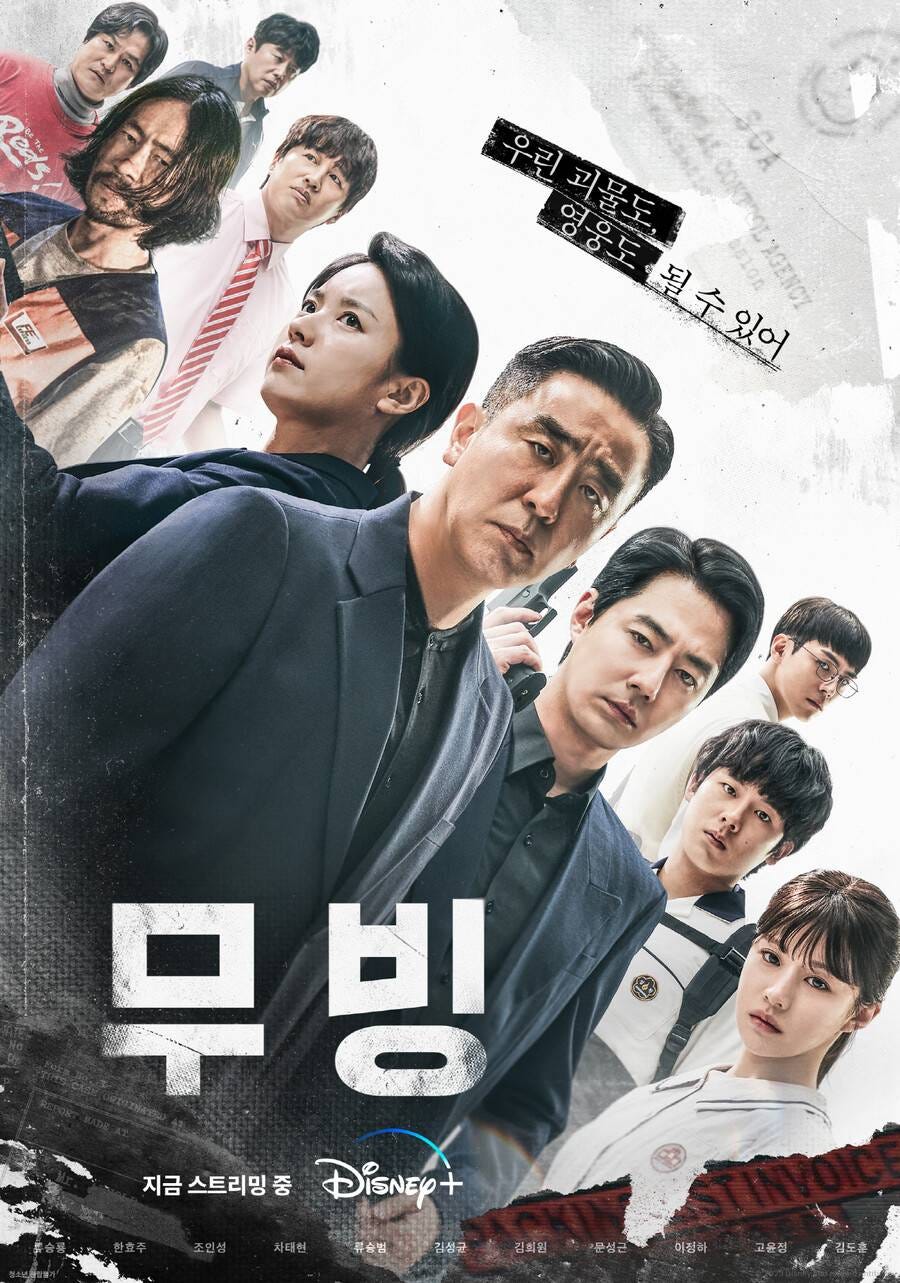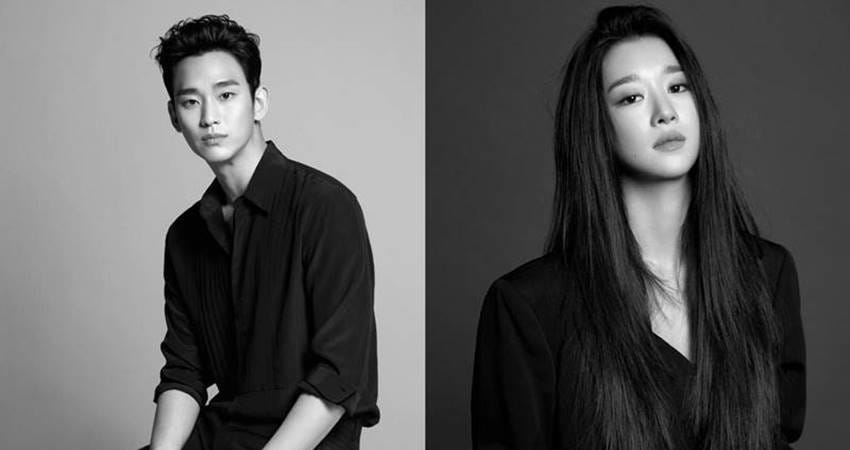"Moving" Beautifully Weaves Smaller Moments Into the K-drama's Splashier Narratives
+ A bonus review of the Ma Dong-seok film "The Gangster, The Cop, The Devil"
Hello, everyone! I hope you all are enjoying your weekend. We are having another cold and rainy day. But I prefer this kind of weather to the stifling heat we had just a few weeks ago. My family is watching college football and, when that’s over, we’ll be enjoying a Korean zombie film as we munch on pizza and salad.
Which reminded me that I hadn’t shared my review of the highly touted (and with good reason) K-drama “Moving.” So without further ado, here it is. I’ve also added a short bonus review of the Ma Dong-seok film “The Gangster, The Cop, The Devil” — which is exactly what you think it will be. (Please check out the anchor links below if you’d prefer to read just one, but not the other.)
• "Moving" (무빙) ☆☆☆½
• "The Gangster, The Cop, The Devil" (악인전) ☆☆
Caveat: I can’t add the links until after this post is live on the app. So those of you who read my posts via the emailed newsletter won’t have access to the individual links. Mea culpa…
A reminder about my reviews: The ratings are based on a ☆☆☆☆ system and reflect my own personal tastes. If I’ve made a flagrant error, please leave a comment and I will correct it (and tag you). If you just don’t agree with my opinions, then we’ll both have to live with that.
"Moving" (무빙)
☆☆☆½
Kim Bong-seok (played by Lee Jung-ha)
Jang Hui-soo (played by Go Youn-jung)
Jang Joo-won (played by Ryu Seung-ryong)
Lee Mi-hyeon (played by Han Hyo-joo)
Kim Doo-sik (played by Jo In-sung)
↑Note: Korean names denote the surname followed by the given name.
ATTENTION: There are some spoilers ahead in the following review.
There is a lot going on in "Moving," Disney's most-watched K-drama to date. Initially, it appears the series will center on heroic teenagers à la "Weak Hero Class 1" and "All of Us Are Dead." But just as we get used to three high school students with supernatural powers — Bong-seok can fly! Hui-soo heals ultra quickly from injuries! Gang-hoon (Kim Do-hoon) is lightening fast and strong! — the show introduces us to their parents. And as intriguing as the storylines are for the children, it's the parents' arcs that really piqued my interest.
Bong-seok's mom, Mi-hyeon, runs a tonkatsu restaurant and encourages him to eat and gain weight. Hui-soo's seemingly mild-mannered dad, Joo-won, fries up chicken for a delivery service he hopes takes off. And Gang-hoon's mentally-challenged father, Jae-man (Kim Sung-kyun), quietly waits for his top-student son to come home from school every day.
What the children don't know yet is that their very normal-looking parents had once been elite spies for the National Intelligence Service (NIS). Well, Jae-man had been scouted and ultimately dismissed, because of his intellectual deficiency. But each has one parent who has super powers. Actually, Bong-seok hit the superpower lotto, inheriting his mother's acute hearing and his father's ability to fly.
Rather than embracing the children's abilities, the parents are desperate to hide them. Why? Because the NIS agent responsible for endangering their own lives now has his eyes set on finding special children and using them for ... the betterment of South Korea? Sure. But mostly to make himself indispensable.
The teenagers grew up knowing that they were not to talk about their powers. The parents explain away their almost magical abilities with a series of half truths. But as the kids get older, they know they're not like their classmates.
The NIS has set up a high school program where children demonstrating special powers are recruited and trained. And this is where Bong-seok, Hui-soo and Gang-hoon learn more about each other as they figure out elements of their own lives. I don't think it's a coincidence that Bong-seok can't control his levitation whenever Hui-soo pays attention to him.
Did anyone else view that as a metaphor for ... well, you know?! The only way he can control his physical reaction to Hui-soo is by desperately thinking about boring things that aren't related to her. This is a relevant depiction, because it gets across how there are so many things this child is trying to control at his youthful age. But when it comes to something every awkward teen goes through — puppy love — he is powerless.
This is not an easy series to watch at times because of the onslaught of violence and/or gore in every episode. I had to turn away from certain scenes, but I could still hear the bone-crunching carnage.
My absolute favorite storyline revolves around Hui-soo's parents. Her mother worked at a coffee delivery service where men could pay an additional amount for a little personal attention. Before being recruited by the NIS, her father was an enforcer for a gang. Nicknamed the Monster, he was an indestructible man who made some extra money by throwing himself in front of cars and collecting compensation from scared drivers. They meet cute when he is wandering the streets of Seoul. Though he can victoriously take down a couple dozen men, he is horrible at directions and can't find his way back home.
What I really love about this series is how so many different stories are beautifully interwoven. People who you see for a few minutes in earlier vignettes pop up with important story arcs in the second half.
Directed by Park In-je, "Moving" also does an admirable job of including fictionalized versions of real-life events, which drive home how the betterment of the country often comes at the expense of its most powerless citizens. When we lived in Seoul, I grew up in the Cheonggyecheon area, which at the time was nothing special. In Episode 14, there's a dramatiized version of the real-life 2003 protests that Cheonggyecheon residents held. They were opposed to their neighborhoods and businesses being demolished to make room for the area's restoration. While the area has become one of Seoul's most visited sites, hundreds of street vendors lost their livelihood when they were pushed out of their neighborhood. And residents who had previously lived there could no longer afford to return.
That's the kind of ghoulish behavior that has become normalized in too many parts of the world. What "Moving" does so well is integrate these seemingly smaller moments into the show's overall splashier narratives.
Airdates: Disney+ released the first seven episodes on August 9, followed by two episodes every Wednesday. The streaming service released the final three episodes on September 20. Each of the 20 episodes runs less than an hour. (I was provided screeners for the first half of this series and then watched the final 10 episodes on a trial subscription to Hulu.)
NOTE: This trailer is in Korean. But there are subtitles for the series.
Spoiler Alert:
• In Episode 5, we learn more about Hui-soo. After watching a classmate bullied by a gang of girls, she challenges the leader to a fight. She ends up beating all 17 of the girls. It's during this fight that she realizes she's not a normal human being. She can be hit with a bat, bleed and have broken bones. But her body quickly regenerates. So while the bullies had visible injuries, she had none. Which meant that since there was no proof that she was a victim — after all, where are her broken bones and injuries? — her father had to sell their house to pay settlements to the "victims.''
OK, the part that was absolutely maddening is that several dozen students shot videos of the fight, which means they saw the other girls attacking Hui-soo. But no one — not even Hye-won, the bullied student — stuck up for her. That girl was the daughter of a wealthy family. Wouldn't they have had the power to pressure the school into taking action? (Or, at the very least, wouldn't they insist that the girl attends school with a bodyguard, since the school allowed her to get beat up daily?)
ETA: Check out the comment from
below, which better explains Hye-won’s role in this series.• As with many Korean shows, there is an adoption element here with the introduction of Frank (Ryoo Seung-bum). He was one of six children who was kidnapped by the U.S. government and trained to become elite assassins. His name has no special meaning. The children were given names that started with A through F. Hence, Frank for him. But they never go into how he became invincible and was able to regenerate. His mother seemed to be a normal (but immoral) mortal. Did his father have super powers? And, if so, why wasn't there any mention of his background?
• The sweetest part of this show is the romance between Ji-hee (Kwak Sun-young) and Ju-won. In Episode 11, she tells him that she likes the Hulk because he looks like a monster, but he's a nice guy inside. Ju-won smiles, because that's how he is, too. He says he likes pro wrestling because the good guy always wins. Sadly, she will die in a car accident.
• Mi-hyeon and Doo-sik's relationship begins with subterfuge. She was picked by the NIS to seduce him, because she was the youngest and prettiest operative that they had. He did end up falling for her, but was aware of what she was doing. In Episode 12, when her alliance with him puts her in danger, Doo-sik casually tells his partner Ju-won that they will operate "like we always do." It was a code between them. Doo-sik knew that Mi-hyeon would be suspected of helping him, so he pretends to be angered by her betrayal and shoots her. But Ju-won understood what was expected of him and took the bullet for her, knowing that the pain would be minimal for him.
"The Gangster, The Cop, The Devil" (악인전)
☆☆
Jang Dong-soo (played by Ma Dong-seok)
Jung Tae-suk (played by Kim Mu-yeol)
↑Note: Korean names denote the surname followed by the given name.
"The Gangster, The Cop, The Devil" is not a great film, but it's watchable because its star is Ma Dong-seok. The burly actor stars as a mob boss whose street credibility takes a beating when he is nearly killed by a floppy-haired serial killer (Kim Sung-kyu) — whose modus operandi is rear-ending drivers and then savagely stabbing them to death.
Add a cop into the mix who, while dirty, also is good at his job. Knowing that a promotion is on the line if he catches the serial killer, Tae-suk aligns himself with the mob boss, Dong-soo — the only victim to survive the serial killer's attacks. Dong-soo wants to capture and kill his assailant, partly for revenge — but also to prove to the rival gangs that his hospitalization is just a temporary setback and not a sign of weakness.
There are a lot of subplots, not all of which work. This film lacks the humor that made Ma's "The Outlaw" franchise so watchable, even though there's as much violence in those films as there is in "The Gangster, The Cop, The Devil." Park Se-seung's cinematography is dark, in keeping with the theme of the film. However, Lee Won-tae's direction at times is so frenetic that it's difficult to figure out what exactly is going on.
The ending is satisfying though, with loose ends neatly tied up. And in some ways, we get to see that justice has been served.
Trivia: Chinese social media users said that when they changed their profile photo to one featuring Ma Dong-seok, they were treated better by customer service. The theory? A photo of the intimidating actor gets more immediate attention than a picture of us normal puny (and non-threatening) humans.
Release date: The 109-minute film opened on May 15, 2019 in South Korea. (I watched this on Viki.)
Spoiler Alert: This film is incredibly violent, with no likeable characters or ones viewers want to cheer for. Yes, we are a bit enamored with Dong-soo (because of how Ma plays him). But even the actor's charm can't disguise Dong-soo's numerous flaws. After all, he's a man who deals with a rival's yappy minion by reaching into the man's mouth, yanking out his teeth and then serving it to his nemesis in a drink.
RECOMMENDED:
• BECKHAM (Netflix.) These four short episodes will transport viewers back to a time when Becks and Posh were the It couple and international sensations. The documentary gives you insight into his iconic career, and also their marriage (which many had said would end in a quick divorce). I found it charming that he is very Type A when it comes not only to his career, but also his home. Cleaning and organizing appears to be therapeutic for the footballer and I am in awe of his impeccable closet (and kitchen).
• THE WORST OF EVIL (Hulu in the U.S. and Disney+ in some other countries.) The finale will release on October 25. It took a while for Ji Chang-wook to get back into the swing of things after he was released from mandatory military duty in 2019. He had a string of so-so dramas (“Melting Me Softly,” “Backstreet Rookie,” “Lovestruck in the City,” “The Sound of Magic”) — some of which I couldn’t finish. But he has picked much better projects with 2022’s “If You Wish Upon Me” and this year’s “The Worst of Evil,” which is a spectacular series that shows off his range.
© 2023 JAE-HA KIM | All Rights Reserved







I really hope they do a second part, that end was too open. Also, which was your favorite character? Mine was Jang Joowon. It could be because Hulk is also one of my fav heroes 😅, but i got really attached to him. And Ryu Seung Ryong's acting was espectacular, those action scenes were incredible (I was shocked to know he is 52), his crying was amazing too 🙌🏻👏🏻, he made me cry a lot! I saw he won an award for Best Lead Actor with Moving. Very well deserved!! ✨ i also liked they gave us a back story of almost all the characters, including the "villians", because we could see why they did what the did, they were forced to do it.
안녕하세요! Thank you for your review of "Moving"! I watched that, too, and was blown away by it. Never went a 20-episode-series by so quickly! Have you watched all 20 episodes of it? Spoiler ahead, so keep on reading at your own risk: re the bullied girl: she actually wasn't the daughter of a rich family here but also one of the spies! She seems to have the super power of not ageing and was there at school to catalyze Jang Hee-Soo's superpower. At the end of episode 20 (I think 🤔) she is shown at the NSI's HQ berating leader Min for his poor work. Lee Kang-Hoon sees her in passing when he is walking out of Leader Min's office and looks stymied when he sees her.
I loved the series for its storytelling and acting, and I really hope there will be another season where we can dive even deeper!